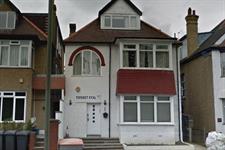A religious group has been accused by the Charity Commission of a catalogue of accounting failings and conflicts of interest, including one that it called a “criminal offence”.
Beth Yosef Foundation was removed from the register of charities in June at the end of a six-year statutory inquiry that included a host of missed deadlines and orders that were not complied with.
In a hard-hitting report published today, the commission reveals numerous problems relating to the purchase and eventual sale of 8 Queens Road, Hendon, north London, which was for a time used as a synagogue.
It says the charity’s trustees had a “serious disregard” for proper financial controls and record-keeping.
The report says that some of the charity’s actions amounted to “serious mismanagement and misconduct”, while repeated failure to submit accounts and accompanying documents was a breach of a trustee’s statutory obligations and “a criminal offence”.
It says: “There was evidence of both poor governance and poor financial management of the charity and its affairs.
“The inquiry concluded that the trustees had not complied with or fulfilled their duties as trustees under charity law.
It says there was a failure to:
-
exercise reasonable care and skill in the execution of their roles and to manage the charity’s resources responsibly in the best interests of the charity
-
ensure that conflicts of interest were identified, recorded and managed
-
ensure proper decision-making processes were followed and to properly record their decision making
-
ensure sufficient financial controls and procedures to protect the charity’s property
-
file annual accounting information, in accordance with their statutory obligations, on time.
The foundation was incorporated on 20 July 1998 to advance the orthodox Jewish religion, in particular Sephardi Jews across the world, while furthering education and religious learning and relieving hardship of the same group.
It ran into trouble in December 2016, when the commission opened the statutory inquiry, triggered by its failure to submit annual accounts since February 2012.
The inquiry, which was closed today, highlighted that the charity’s articles of association said it should have at least three trustees.
The decision to wind up and sell the Queens Road property was made by two trustees, while the three appointed trustees at the time “failed to provide any evidence that their appointments had been made in accordance with the charity’s governing document”.
It emerged that the charity’s lender was also the prospective buyer, while one trustee was their brother-in-law and another was the lender’s aunt.
“The inquiry found that the ability of the trustees to effectively operate and manage the charity and avoid conflicts of interest was seriously compromised by the fact that two of the trustees were connected to the lender,” the report says.
The regulator also concluded that the trustees were linked to another charity, which was allowed to use the Queens Road building. One was a trustee of both while another was this trustee’s designated contact.
The report says a trustee “failed to demonstrate that the trustees had correctly identified or managed such matters of conflict”.
He was also “unable to demonstrate” awareness of obligations when selling charity land, in particular the requirement to obtain prior authorisation from the commission when disposing of property to a connected person.
It meant the trustees were “in breach of their duties to act in the charity’s best interest and avoid conflicts of interest”.
The inquiry found trustees had “a serious disregard for, and/or lack of understanding of, the importance of proper financial controls and record keeping”.
Trustees failed to comply with their statutory duty to file annual reports and accounts with the commission for the financial years 2013 to 2016 within 10 months of the year end, the commission found.
They also failed to file the charity’s accounts on time between 2017 and 2019. The accounts were 888, 525 and 159 days late, respectively.
Then, “despite considerable, ongoing advice and guidance to the trustees”, the accounts filed on 7 September 2020 did not include all the disclosures required.
The charity had entered into a number of unsecured loans with the lender, which included a £150,000 loan to convert the upper floor of the charity’s property into residential flats, which was completed by another firm belonging to the lender.
These flats were rented out for the charity by the lender’s wife, with rent collected by the lender, the commission said. But no records were found relating to the decision-making process.
A “secured loan” of £668,000 borrowed by Beth Yosef Foundation in 2001 to buy the building was assigned to the lender. To settle the loan, the charity agreed to a £1.3m private sale to the same lender.
High Court action resulted in the property being sold at auction in December 2018, with surplus funds from the sale – £136,000 – being held in trust by the official custodian.
Despite the charity’s bank account closing in April 2016 and the trustees’ claims that it was dormant and had no income, the commission found that it still received rent and “substantial funds” had been collected on its behalf.
The charity’s “lack of basic financial controls or procedures and apparent unwillingness and/or inability to have proper oversight and control of these matters exposed its funds to undue risk”, the report says.
“This is misconduct and/or mismanagement in the administration of the charity by the trustees.”
